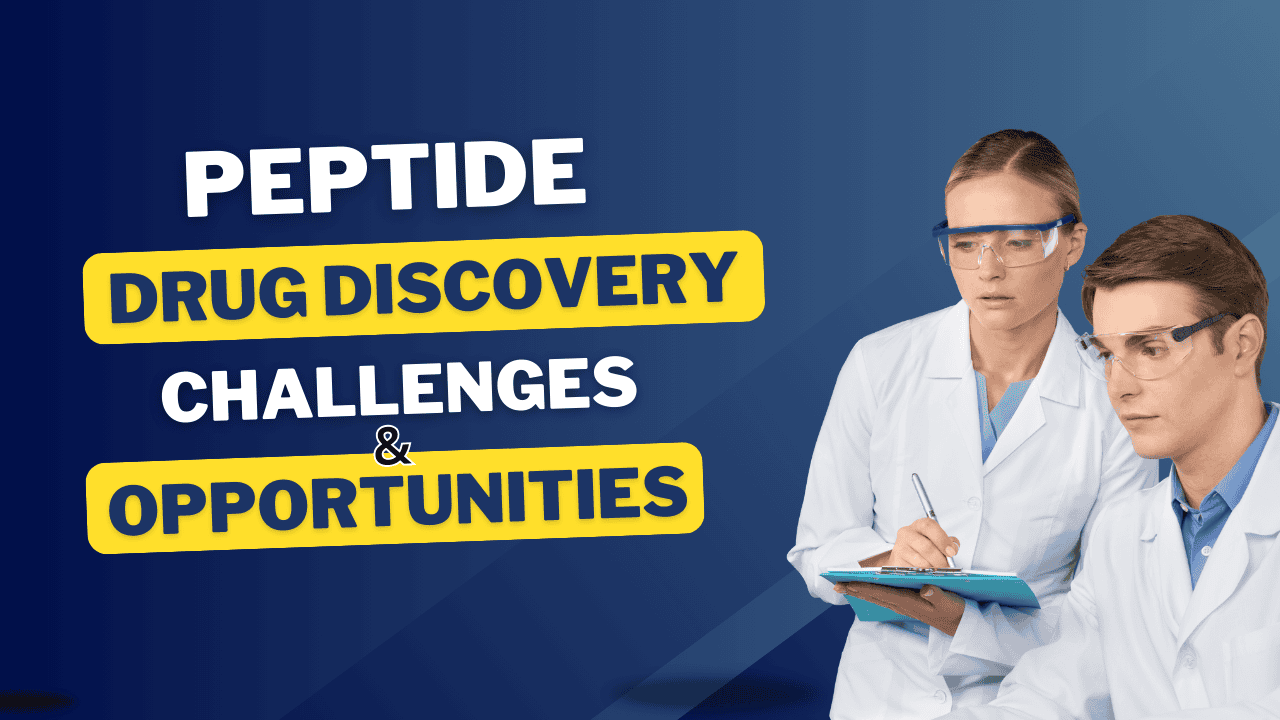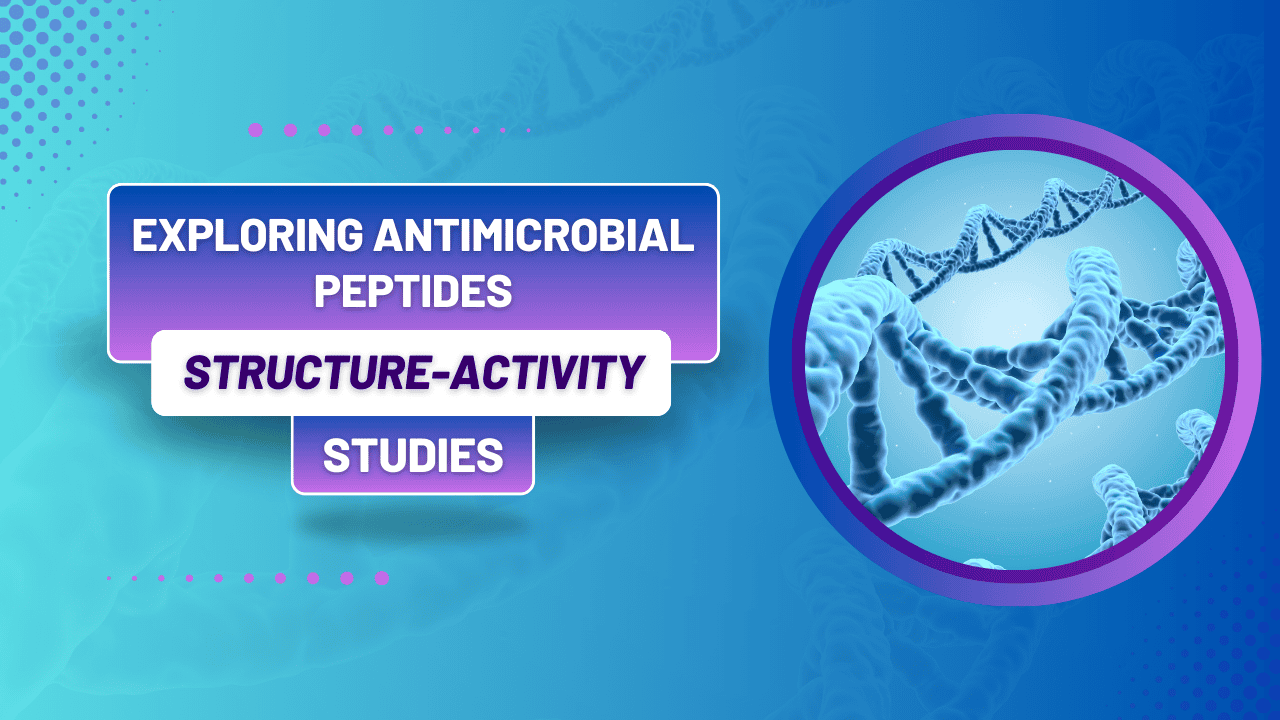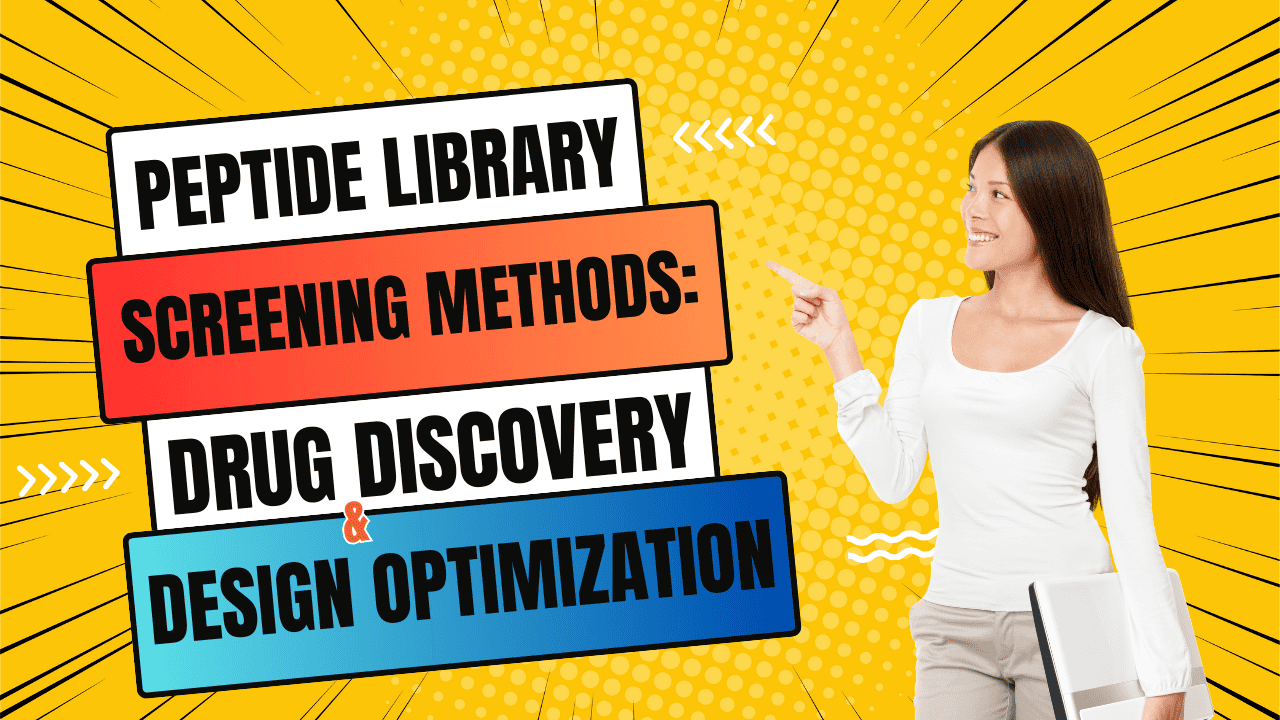

In the rapidly evolving landscape of biotechnology, peptide therapeutics have carved out a significant niche.
The strides in peptide drug discovery and development herald a promising future, poised to revolutionize patient care with novel and effective treatments.
This deep dive explores the milestones, challenges, and future trends in peptide therapeutics.
With a mix of excitement for impending breakthroughs and a nod to the rich history of therapeutic peptide development, this article is a must-read for anyone passionate about the next frontiers in medicine.
Peptide-based therapeutics have seen a rise in popularity due to their high specificity and potency. The field of peptide drugs offers a new peptide to tackle ailments in ways small molecule drugs often cannot. Remember, peptides are more than just a trend—they’re the future.
From insulin, the first therapeutic peptide to be marketed, to the latest cyclic peptides, the evolution has been groundbreaking. The development of peptide drugs has shown steady progress, from basic amino acid peptide chains to complex peptide hormones like the glucagon-like peptide 1 receptor agonist.
Bioactive peptides are molecules that interact with specific enzymes or receptors to bring about physiological effects. These peptide drugs are often derived from natural sources and have bioactive properties that make them ideal candidates for novel therapeutics.
Innovation in peptide synthesis and peptide chemistry have paved the way for targeted peptide drug development. Techniques like solid-phase peptide synthesis streamline the creation of peptide sequences, enhancing the efficacy and stability of the peptide drugs.
When developing therapeutic peptide drugs, it’s crucial to consider their stability, delivery mechanisms, and peptide drug design. Research often focuses on optimizing the peptide bond to enhance stability while ensuring effective delivery of the therapeutic peptide.
There are many exciting advancements in drug development, such as the use of stapled peptides, which boast improved bioavailability and half-life. The development of novel drug delivery systems also plays a pivotal role in the clinical success of peptides as therapeutics.
Interactions between peptides and proteins are foundational in peptide drug discovery. These interactions can help identify drug targets, facilitating the design of peptide ligands that are more effective and specific.
One notable trend is the increasing approval rates by the US Food and Drug Administration for peptide drugs, reflecting their efficacy and safety. Another trend is the innovation in peptide drug delivery systems that enhance the absorption and function of therapeutic peptides.
New peptides are continually being discovered, broadening the horizon of peptide therapeutics. These discoveries include cyclic peptides and cell-penetrating peptides, which offer unique advantages in intracellular targeting.
Synthetic peptides, designed and optimized through advanced peptide chemistry, provide a versatile platform for developing targeted therapies. These synthetic peptides can be tailored to address various medical needs, from cancer to infectious diseases.
Bioactive peptides have shown remarkable therapeutic potential due to their ability to modulate physiological processes at a molecular level. Their specificity and potency make them ideal candidates for next-gen peptide therapeutics.
The activity of the peptide largely influences its therapeutic application. Bioactive peptides necessitate meticulous design tailored to optimize their therapeutic properties, ensuring they provide maximum benefit with minimal side effects.
Consider the antimicrobial peptide that has shown promise in fighting antibiotic-resistant bacteria. Another example is vasoactive intestinal peptide, used for its anti-inflammatory and immune-modulating effects.
Despite their potential, bioactive peptides face challenges like stability and delivery. Advances in peptide delivery systems and peptide drug design are crucial to overcoming these hurdles and bringing these therapies to market.
Peptides from natural sources often exhibit innate bioactivity, which can be harnessed for therapeutic purposes. These natural peptides can provide a basis for the development of new peptide drugs with unique therapeutic properties.
Natural peptide drugs have a profound impact, offering alternatives to traditional small molecule drugs. Examples include peptide inhibitors derived from venoms or plant extracts used in treating chronic diseases.
Extraction and purification techniques are critical for isolating peptides from natural sources. Ensuring the purity and activity of the peptide isolated is key for it to be developed into a successful therapeutic agent.
Designing peptide-based therapeutics entails understanding peptide sequence and structure. Techniques like solid-phase peptide synthesis allow for the precise creation of peptides with desired properties.
Modifications such as cyclization and stapling can improve the stability of a peptide, making it more resistant to degradation and increasing its therapeutic potential. These modifications tailor the peptide’s properties to enhance its clinical application.
Synthetic peptides offer the advantage of customizable sequences and structures, while natural-derived peptides often come with inherent bioactivity. Both have their pros and cons, but advancements in peptide synthesis are bridging the gap.
Cutting-edge tools like AI and computational biology are revolutionizing peptide drug design. These tools aid in the optimization of peptide sequences for better activity, stability, and specificity.
The global peptide therapeutics sales market is experiencing rapid growth, driven by the increasing adoption of peptide drugs. The peptide drug market is burgeoning with new approvals and ongoing research into peptide drug discovery and development.
Current trends indicate increased investments in peptide drugs from natural sources and synthetic peptides. There’s a growing interest in the development of peptide inhibitors and cell-penetrating peptides for various therapeutic applications.
Market demand plays a crucial role in driving innovation in peptide therapeutics. Rising consumer demand for targeted and effective therapies propels the research and development of new peptide drugs and optimized drug delivery systems.
Peptide drugs are making significant strides in oncology, offering targeted therapy options with reduced side effects. Examples include peptide inhibitors that specifically target cancer cells, enhancing treatment efficacy.
Peptide hormones like glucagon-like peptide 1 receptor agonists have revolutionized diabetes management. These peptides improve glucose control and have become standard components of diabetes therapy.
Antimicrobial peptides are emerging as crucial tools in the fight against antibiotic resistance. These peptides offer a novel approach to targeting resistant bacteria, providing an alternative to traditional antibiotics.
Case studies abound, such as the successful application of vasoactive intestinal peptide in treating inflammatory diseases. Another notable example is the use of cyclic peptides in cancer therapy, showcasing their therapeutic potential.
Challenges like peptide stability, delivery, and cost of production persist. Overcoming these requires innovative solutions in peptide synthesis and peptide design.
Navigating the regulatory landscape involves demonstrating the safety, efficacy, and quality of peptide drugs. Addressing these hurdles requires thorough clinical development and robust regulatory frameworks.
The future is bright for peptides as therapeutics, with expectations of more advanced peptide drugs and novel delivery systems. Ongoing research and technological advancements will continue to push the boundaries of what is possible in peptide therapy.
AI is revolutionizing peptide drug discovery, enabling the rapid prediction and optimization of peptide sequences. This technology enhances the efficiency and accuracy of designing effective peptide therapeutics.
Computational biology tools facilitate the simulation and modeling of peptide and protein interactions. These tools are invaluable in identifying promising peptide drug candidates and optimizing their therapeutic properties.
Technologies like high-throughput screening and next-gen sequencing are transforming peptide drug research. These advancements accelerate the discovery and development process for novel peptide therapeutics.
Absolutely. Personalized medicine can leverage the specificity and versatility of peptides to tailor treatments. This approach ensures that therapies are more effective and better tolerated by patients.
Peptide therapeutics allow for the customization of treatments based on individual patient profiles. This precision ensures maximum efficacy and minimal side effects, setting a new standard in personalized care.
Precision medicine stands to benefit immensely from the application of peptide drugs. The ability to design peptide sequences specific to a patient’s genetic and molecular profile can revolutionize treatment paradigms in various diseases.
Market trends indicate a growing interest in peptide drugs due to their specificity and efficacy. Advances in peptide drug delivery and peptide drug design are also driving interest and investment in this field.
The economic landscape shows a favorable outlook for peptide drugs, with increasing investments and funding in peptide research. This economic support is crucial for the continued development of innovative peptide therapeutics.
Investors are eyeing opportunities in the peptide therapeutics market, driven by the potential for high returns on innovative peptide drugs. The market for peptide is ripe for growth, especially with the ongoing advancements in peptide technology.
Regulatory considerations include ensuring the safety, efficacy, and quality of peptide drugs. The Food and Drug Administration has stringent guidelines that must be adhered to in the development and approval of peptide therapeutics.
Ensuring the safety of peptide drugs involves rigorous clinical trials and continuous monitoring. The stability of the peptide and its potential side effects need thorough evaluation to ensure patient safety.
Overcoming regulatory challenges requires a comprehensive approach that includes thorough clinical development and robust safety data. Collaboration with regulatory bodies and adherence to guidelines is paramount for successful approval.
Development pipelines for peptide drugs are expanding, with numerous candidates in active clinical development. Innovations in peptide synthesis and peptide delivery are enhancing the prospects for successful peptide therapeutics.
Collaborations between biotech firms, academic institutions, and pharmaceutical companies are driving peptide drug development. These partnerships are crucial for pooling resources and expertise to advance novel peptide drugs.
The future pipeline of peptide-based therapeutics looks promising, with ongoing research into cyclic peptides, cell-penetrating peptides, and peptide inhibitors. These innovations promise to bring new and effective peptide therapeutics to market.
In the realm of oncology, peptide drugs have shown remarkable breakthroughs. For instance, peptides targeting specific cancer cell receptors have demonstrated significant efficacy in treating various cancers.
Antimicrobial peptide therapies have found real-world applications in combating antibiotic-resistant infections. These therapies are being integrated into clinical practice, offering new hope in the fight against resistant pathogens.
Successful peptide drug launches offer valuable lessons in terms of clinical development, regulatory approval, and market acceptance. These case studies highlight the importance of a robust development strategy and thorough understanding of therapeutic potential.
The future promises exciting breakthroughs, potentially in the realm of precision medicine and personalized peptide therapies. Innovations in peptide synthesis and delivery will likely lead the charge.
Advances in peptide drugs will shape future therapies by offering more targeted, effective, and safer treatment options. These drugs will likely become integral components of treatment regimens for a variety of conditions.
To prepare for the next generation of peptide-based therapeutics, continued investment in research and development is crucial. Embracing technological advancements will ensure that the potential of peptide therapeutics is fully realized.
Evolution of Peptide Drugs: The field has grown from simple peptides to complex structures like cyclic peptides.
Bioactive Peptides: These molecules are leading the charge in novel therapeutic applications due to their specificity and potency.
Natural Peptides: Therapeutics derived from natural sources offer unique bioactive properties.
Technological Advances: AI, computational biology, and other tech innovations are revolutionizing peptide drug discovery and development.
Clinical Applications: Peptide therapeutics show promise in oncology, diabetes management, and combating antimicrobial resistance.
Market Dynamics: The peptide drug market is growing rapidly, with increasing investments fueling advancements.
Future Prospects: The future of peptide therapeutics looks promising, with upcoming breakthroughs expected in precision medicine and novel delivery systems.
This deep dive into peptide therapeutics reveals a landscape rich with potential, driven by innovation and a relentless pursuit of better patient outcomes.
The future of peptide therapeutics looks promising, with continuous advancements in peptide drug development and design. Current advances in peptide drug discovery indicate that future directions will focus on personalized and precision medicine.
Peptide drug development is the process of designing, synthesizing, and testing peptides as potential therapeutic agents. This includes peptide drug discovery, synthesis, optimization, and clinical trials to ensure safety and efficacy.
Yes, peptides hold significant potential as the future of medicine due to their high specificity, potency, and minimal side effects. Their therapeutic potential is supported by current advances in peptide drug development and clinical applications.
Peptide drugs have a rich history, beginning with the therapeutic use of insulin. Over time, the field has expanded to include various classes of peptide drugs, with approximately 80 peptide drugs approved by regulatory agencies.
Absolutely, peptides are considered the future due to their versatility and effectiveness in treating a range of diseases. The current status and future of peptide therapeutics show promising trends in peptide drug discovery and development.
Potential downsides include allergic reactions, limited stability, and delivery challenges. These issues are being addressed through advances in peptide synthesis and drug delivery technologies.
Peptides are popular due to their high specificity, low toxicity, and ability to target diseases at the molecular level. Additionally, recent advancements and current development trends in peptide drug design have boosted their appeal.
Many peptides are FDA-approved, but new peptide drugs must undergo rigorous testing to meet safety and efficacy standards. The time of peptide approval often depends on the clinical development process.
Disadvantages include potential immunogenicity, short half-life, and delivery limitations. Advances in solid-phase peptide synthesis and modified peptide formulations are addressing these issues.
In addition to short half-life and stability issues, peptide therapeutics can be costly to produce. Advances in drug delivery systems and novel drug design aim to mitigate these disadvantages.
Dr. David J. Craik is a preeminent authority in the field of peptide therapeutics, specifically known for his groundbreaking work on cyclic peptides. With over three decades of experience, Dr. Craik has significantly advanced the understanding of peptide stability and bioactivity. His research has immense implications for the development of more effective peptide drugs, particularly in the treatment of cancer and neurodegenerative diseases. Some of his notable publications include:
The Cyclic Peptide Heptapeptide C-Terminal Amidative Cysteine/Threonine-α – This seminal work, published in Bioorganic & Medicinal Chemistry Letters, explores the structure and function of cyclic peptides, providing crucial insights into their therapeutic potential.
Discovery of Cyclotides: Peptide-Based Drug Development – Published in Annual Review of Pharmacology and Toxicology, this article delves into the discovery and therapeutic applications of cyclotides, highlighting their unique properties.
Dr. Craik’s contributions have been pivotal in demonstrating the therapeutic potential and practical applications of cyclic peptides. His work has earned him prestigious awards such as the Ralph F. Hirschmann Award in Peptide Chemistry, underscoring his authority and trustworthiness in the field.
Dr. Jean Martinez is a distinguished researcher in peptide and protein chemistry, with particular expertise in peptide drug development and design. Over the past 25 years, Dr. Martinez has focused on creating modified peptides that enhance the therapeutic properties of peptide drugs. His innovations have significantly impacted the development pipeline of novel peptide therapeutics. Key publications by Dr. Martinez include:
Recent Advances in Stapled Peptides – This article, published in Accounts of Chemical Research, provides a comprehensive overview of the design and application of stapled peptides, an area where Dr. Martinez’s contributions have been particularly influential.
Peptide-Based Drug Development: A New Paradigm – Published in Expert Opinion on Drug Discovery, this paper discusses novel strategies in peptide drug design and development, showcasing the innovative approaches that have emerged from Dr. Martinez’s lab.
Dr. Martinez’s research is characterized by its rigor and ingenuity, making significant strides in the field of peptide therapeutics. He has been recognized with numerous accolades, including the European Peptide Society’s Erhardt L. Grosse Award, which attests to his expertise and the respect he commands in the scientific community.
Chen, C. H., Zan, B., Ulmschneider, J. P., Wimley, W. C., Lu, T. K., Ulmschneider, M. B., & Zhou, L. (2023). Development of membrane‐active peptide therapeutics in oncology. Journal of Peptide Science, 29(8). https://doi.org/10.1002/psc.3482
Chourasia, R., Padhi, S., Phukon, L. C., Abedin, M. M., Sirohi, R., Singh, S. P., & Rai, A. K. (2022). Peptide candidates for the development of therapeutics and vaccines against β-coronavirus infection. Bioengineered, 13(4), 9435–9454. https://doi.org/10.1080/21655979.2022.2060453
Esposito, S., Orsatti, L., & Pucci, V. (2022). Subcutaneous catabolism of peptide therapeutics: bioanalytical approaches and ADME considerations. Xenobiotica, 52(8), 828–839. https://doi.org/10.1080/00498254.2022.2119180
Ji, X., Nielsen, A. L., & Heinis, C. (2023). Cyclic peptides for drug development. Angewandte Chemie International Edition, 63(3). https://doi.org/10.1002/anie.202308251
Lian, Z., Wang, N., Tian, Y., & Huang, L. (2021). Characterization of Synthetic peptide Therapeutics Using Liquid Chromatography–MaSs Spectrometry: Challenges, solutions, pitfalls, and future perspectives. Journal of the American Society for Mass Spectrometry, 32(8), 1852–1860. https://doi.org/10.1021/jasms.0c00479
ALL ARTICLES AND PRODUCT INFORMATION PROVIDED ON THIS WEBSITE ARE FOR INFORMATIONAL AND EDUCATIONAL PURPOSES ONLY. The products offered on this website are intended solely for research and laboratory use. These products are not intended for human or animal consumption. They are not medicines or drugs and have not been evaluated or approved by the FDA to diagnose, treat, cure, or prevent any disease or medical condition. Any form of bodily introduction is strictly prohibited by law.




Discount Applied Successfully!
Your savings have been added to the cart.